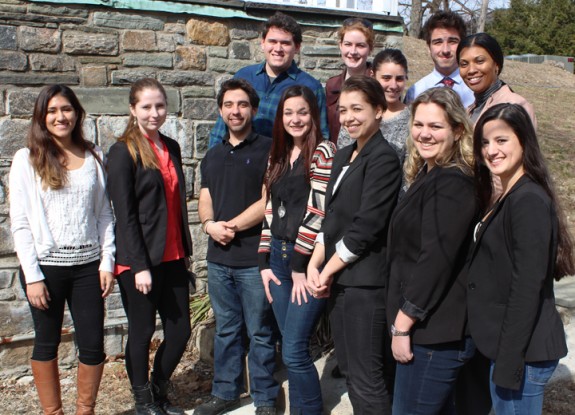Undergraduates Tackle Energy, Food Justice, Invasive Species and Animal Torture
Only seven weeks into the inaugural semester of the Pace Environmental Policy Clinic, an intensive program of professional advocacy training, twelve Pace University students are already affecting change in the public arena.
Last week, the Board of Trustees of the Village of Ossining, NY unanimously adopted an energy resiliency policy authored by clinic students. The policy lays the groundwork for creating a community microgrid, and competing for some of the $40 million that will be available under the NYPrize program Governor Andrew Cuomo announced in his 2014 State of the State Address.

Top, L – R: Carlos Villamayor Ledesma (sophomore, communications), Sara Moriarty (junior, communications), Laura Sorrentino (senior, environmental studies), Conor Strong (senior, environmental studies), Theresa Tumminia (junior, communications). Bottom, L – R: Maricielo Gomez (freshman, communications), Nadya Hall (junior, psychology), James Ward (senior, environmental studies), Jaclyn Barbato (sophomore, environmental studies), Christina Correia (senior, criminal justice), Alexandra Catalano (freshman, political science), Alyssa Boas Vilas (freshman, political science).
“Superstorm Sandy and Hurricane Irene awakened communities up and down the Atlantic coast that they must be energy self-sufficient in order to protect key services that assure public safety,” said Michelle Land, director of the Pace Academy for Applied Environmental Studies, which launched the Clinic in late January. “A microgrid is a locally-based energy supply and distribution system that uses cutting-edge technologies to produce reliable power even when the rest of the grid goes down.” More on the Ossining action here.
In addition to energy resiliency, the Clinic’s docket of issues includes invasive plants and wildlife, circus animal torture, and food justice on campus. The students have created a blog to document the progress of their cases. The ePolicy blog can be found here.
According to Professor Land, the Environmental Policy Clinic is a groundbreaking program of applied studies where student clinicians, in a team setting, work as professional environmental policy practitioners under the supervision of faculty from Pace Academy, and in consultation with faculty from across Pace schools and colleges. Their primary responsibility is to design and implement new policies and policy reforms that address real world environmental issues by representing “client,” non-profit and governmental organizations from the community and region.
In addition to the Village of Ossining, the Clinic’s clients include Westchester Land Trust on the issue of invasive plants, and the Pace Center for Community Action and Research on food justice.
More on the Clinic, its students and faculty here.
More on Pace Academy here.









